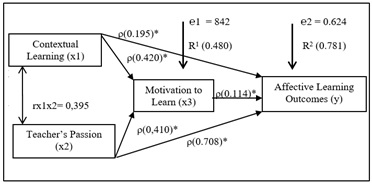
The Effects of Contextual Learning and Teacher's Work Spirit on Learning Motivation and Its Impact on Affective Learning Outcomes
Abstract
Keywords
Full Text:
PDFReferences
Anggraini, I. S. (2016). Motivasi Belajar dan Faktor-Faktor yang Berpengaruh: Sebuah Kajian Pada Interaksi Pembelajaran Mahasiswa. Premiere Educandum: Jurnal Pendidikan Dasar dan Pembelajaran, 1(02).
Caska. (2016). Upaya Peningkatan Kompetensi Guru dalam Implementasi Kurikulum 2013 Melalui Penerapan Pembelajaran Modeling di Provinsi Riau. Proceeding 7th International Seminar on Regional Education.
Direktorat Pembinaan SMP. (2014). Model Penilaian Pencapaian Kompetensi Peserta Didik Sekolah Menengah Pertama. Jakarta: Direktorat Pembinaan SMP.
Dimyati, M. (2013). Belajar & Pembelajaran. Jakarta: Rineka Cipta.
Indrawati, H. & Caska. (2019). How to maintain sustainability of micro and small entreprises of crispy oil palm mushroom: A case study in Riau Province. Journal of Science and Technology Policy Management, 10(2), 431-456.
Indrawati, H. (2013). Upaya Peningkatan Kompetensi Profesional Guru Mata Pelajaran Ekonomi dalam Proses Pembelajaran. Jurnal Pendidikan, 4(2), 84-95.
Indrawati, H. (2011). Meningkatkan Keterampilan Berpikir Kritis Mahasiswa Melalui Implementasi Model Controversial Issues Pada Mata Kuliah Ekonomi Sumberdaya Manusia dan Alam. Jurnal Pendidikan Ekonomi Dan Bisnis, 4(01).
Jukhairiyah, S. (2016). Pengaruh Pendekatan Contextual Teaching and Learning (CTL) dan Motivasi Belajar Terhadap Hasil Belajar Mata Pelajaran IPS Siswa Kelas IX SMP Negeri 5 Kabupaten Pamekasan. Jurnal Penelitian Dan Pendidikan IPS, 10(1), 27-43.
Kwapong, L. S. A., Opoku, E., & Donyina, F. (2015). The effect of motivation on the performance of teaching staff in Ghanaian polytechnics: The moderating role of education and research experience. Global Journal Of Human Resource Management, 3(6), 30-43.
Lotulung, C. F., Ibrahim, N., & Tumurang, H. (2018). Effectiveness of Learning Method Contextual Teaching Learning (CTL) for Increasing Learning Outcomes of Entrepreneurship Education. Turkish Online Journal of Educational Technology. TOJET, 17(3), 37-46.
Liando, N. V. (2015). Students Vs Teachers Perspectives On Best Teacher Characteristics In Efl Classrooms. TEFLIN journal, 21(2), 118-136.
Marina, M., Indrawati, H., & Suarman, S. (2019). Application of Moving Class Learning Models and Teacher Pedagogical Competence on Learning Motivation and Student Learning Discipline. Journal of Educational Sciences, 3(1), 72-83.
Mudana, I. M. G., Rasna, I. W., & Suandi, N. (2013). Korelasi antara Disiplin, Motivasi, dan Semangat Kerja Guru dengan Kemampuan Mengajarkan Bahasa Indonesia di Kelas XI SMAN Se kota Denpasar. Jurnal Pendidikan dan Pembelajaran Bahasa Indonesia, 2.
Mudhofir, A. (2012). Pendidik profesional: konsep, strategi, dan aplikasinya dalam peningkatan mutu pendidikan di Indonesia. Jakarta: Raja Grafindo Persada.
Muhtadi, A. (2011). Pengembangan Sikap dan Perilaku Siswa yang Bermoral dalam Kegiatan Pembelajaran di Sekolah. Majalah Ilmiah Pembelajaran, 7(1).
Nurtanto, M. (2016). Mengembangkan Kompetensi Profesionalisme Guru Dalam Menyiapkan Pembelajaran Yang Bermutu. Prosiding Seminar Nasional Inovasi Pendidikan.
Nooruddin, S., & Baig, S. (2014). Student behavior management: School leader’s role in the eyes of the teachers and students. International Journal of Whole Schooling, 10(2), 1-20.
Olatunji, M. O. (2013). Teaching and assessing of affective characteristics: A critical missing link in online education. International Journal on New Trends in Education and Their Implications, 4(1), 96-107.
Oktavia, R. (2014). Semangat Kerja Guru di Sekolah Dasar Negeri Kecamatan Sipora Utara Kabupaten Kepulauan Mentawai. Jurnal Bahana Manajemen Pendidikan, 2(1), 574-579.
Rahmawati, L., Supardi, K. I., & Sulistyaningsih, T. (2019). Contextual Teaching and Learning Integrated with Character Education to Improve Student’s Motivation and Character in Concentration of Solutions Topic at Pharmacy Vocational School. Journal of Innovative Science Education, 8(1), 484-492.
Rosa, F. O. (2015). Analisis Kemampuan Siswa Kelas X pada Ranah Kognitif, Afektif dan Psikomotorik. Omega: Jurnal Fisika dan Pendidikan Fisika, 1(2), 24-28.
Setyowati, E. (2009). Pendidikan Budi Pekerti Menjadi Mata Pelajaran Di Sekolah. Lembaran Ilmu Kependidikan, 38(2).
Suhelmidam. (2019). Improvement of Teacher Capability Using Contextual Teaching and Learning Learning Models Through in House Training at State 6 Tualang High School. Journal of Educational Sciences, 3(3), 281-291.
Sumarno. (2013). Pembelajaran Kontekstual untuk Meningkatkan Motivasi dan Hasil Belajar Perkuliahan Evaluasi Pembelajaran Mahasiswa Pendidikan Ekonomi FKIP Universitas Riau. Jurnal Pendidikan Universitas Riau, 4 (1).
Wibowo, E. T., & Agustina, Y. (2017). Improving The Motivation and Learning Outcomes Students with Applying “Everyone Is Teacher Here” Learning Method. Jurnal Pendidikan Bisnis dan Manajemen, 3(2), 122-130.
Warsito, W., Asrowi, A., Mulyoto, M. & Anitah, S. (2016). The Effectiveness of IPS-based Contextual Learning to Improve Students Character. International Journal of Active Learning, 1(2), 56-65.
Walangadi, H. (2015). Pendekatan Kontekstual Dalam Meningkatkan Ranah Kognitif Dan Afektif Siswa Pada Mata Pelajaran IPS Di Sekolah Dasar. In Prosiding Seminar Nasional Jurusan PGSD FIP UNP, 1 (1).
Yarnefi, Y., Kartikowati, S., & Gimin, G. (2019). Interest and Factors Affecting Student in Choosing Social Departments. Journal of Educational Sciences, 3(2), 227-236.
Zulirfan, Z., Rahmad, M., Yennita, Y., Kurnia, N., & Hadi, M. S. (2018). Science Process Skills and Attitudes Toward Science of Lower Secondary Students of Merbau Island: a Preliminary Study on the Development of Maritime Based Contextual Science Learning Media. Journal of Educational Sciences, 2(2), 90-99.
DOI: http://dx.doi.org/10.31258/jes.4.1.p.30-43
Refbacks
- There are currently no refbacks.
Copyright (c) 2020 Risyatun Naziah, Caska Caska, Syakdanur Nas, Henny Indrawati

This work is licensed under a Creative Commons Attribution 4.0 International License.
Publisher: FKIP Universitas Riau












